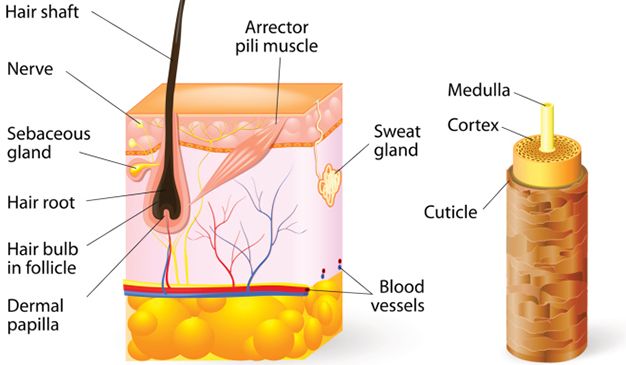The term scab hair has been circulating among our new naturals in recent years. Is it a clinical term or a name to describe something we have tried to make sense of? Naturalhaircarenews.com gives the most common description of scab hair: “Scab hair is the natural hair, (new growth”> which is damaged from previous use of chemical relaxers or other scalp damage. Based on the changes to our scalp and hair follicles from the regular use of relaxer chemicals, the hair that grows post relaxers is malformed or damaged so it grows out wiry and dry. It can take a while for hair that is not damaged to grow from the scalp after years of relaxing or other scalp damage.”
This is a common discussion for naturals, especially those who have previously treated their hair with chemical relaxer or texturizers. Naturals have speculated about the possibility that chemical treatments could somehow damage below the surface! With no proven data to support such speculations, experts have debunked the theories. When discussing the truth about scab hair with Dr. Linda Amerson, a doctor of trichology and expert on hair and scalp disorders, she candidly states, “There is no such thing.” She does however explain what could be going on with the alleged scab hair, and apparently it has everything to do with the condition of the scalp.
“Hair grows from the inside out and the best way to feed the scalp for healthy hair is through a healthy diet. However, the scalp can be damaged by hair styling choices, and in some cases chemicals if applied too frequently or improperly resulting in scalp disorders that can affect the texture of the incoming hair. “- Dr. Linda Amerson.
In other words, it is not simply the use of chemicals that has caused the hair texture to be altered, but rather through the harsh treatment of the scalp.
This is not a matter of semantics. It is not that chemical treatments, primarily relaxers and texturizers, cause scab hair as much as it is improper or frequent use of those chemical treatments can damage the scalp in a manner that results in an altering of the hair texture. The bottom line is that a damaged scalp can change your hair texture, regardless of the means. This can also happen through wearing tight braids, weaves, and other tension bearing extension methods. Amerson warns, “Trendy styles are not always a good choice for all hair textures. By the same token, chemical treatments like relaxers, permanent hair coloring, and other texture altering substances can result in scalp conditions that affect the hair.”
Here are a few more questions we asked Dr. Amerson:
NC: How can we treat the problem?
Dr. Amerson: A microscopic analysis is necessary to see what is not visible with the naked eye. Topical treatments may be necessary.
NC: Are oils helpful to proactively treat the scalp?
Dr. Amerson: When there is a scalp condition, oils can be helpful based on the condition. If there is no condition present, then oils are not necessary, however dry scalp can benefit from natural oils. Determining which oils are necessary is determined on a case-by-case basis.
Mindful styling
Whether scab hair exists, matters not. What matters is that with improper hair care, you can damage your scalp and ultimately your hair. Before choosing a new style for your hair first assess if that style suits your hair texture. For example, Marley twists may not be a suitable choice for type 1, type 2 and really loose type 3 curl patterns, as they typically have a smoother hair texture, although twists are perfect for type 4 hair types. When using extensions, always use hair that matches your texture to prevent excessive friction of the cuticle. Similarly, it may not be wise for fine hair to use high or frequent heat styling methods compared to thicker or coarser hair types that are proven to withstand it better. Equally important is a healthy diet, rich in protein, fruits, and vegetables that nourish the blood that supplies the hair follicle.
Take away
Care for your hair and your scalp from the inside out, considering it is delicate and unique qualities. Your results are guaranteed to speak for themselves! If you suspect scalp damage or disorders, schedule a consultation with your local trichologist for a consultation to get the answers you need.
So, do you think your scalp is in good condition?

